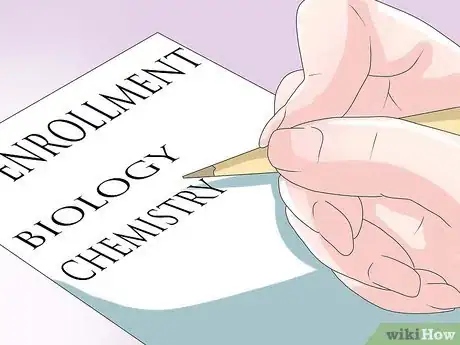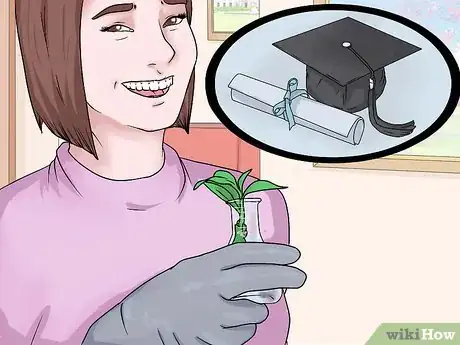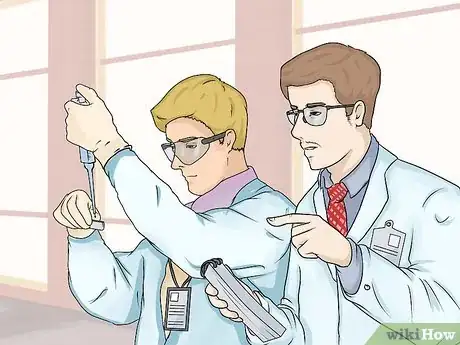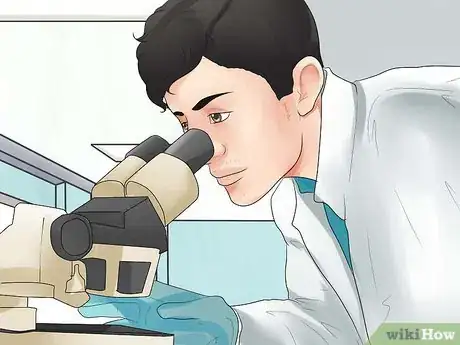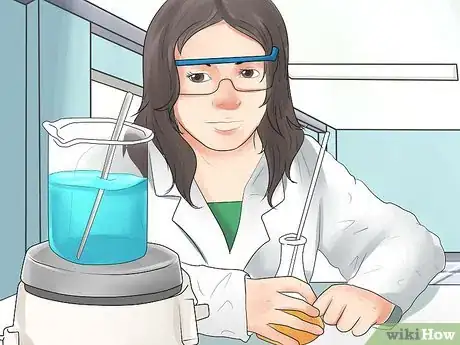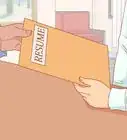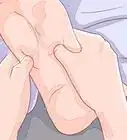This article was co-authored by wikiHow Staff. Our trained team of editors and researchers validate articles for accuracy and comprehensiveness. wikiHow's Content Management Team carefully monitors the work from our editorial staff to ensure that each article is backed by trusted research and meets our high quality standards.
There are 13 references cited in this article, which can be found at the bottom of the page.
This article has been viewed 41,718 times.
Learn more...
A toxicologist studies the effects that toxins or chemicals have on humans, animals, plants and other living organisms. Medically trained as a scientist, a toxicologist conducts field studies and performs laboratory work to determine the existence of toxins and finds ways to prevent them from spreading within the environment. Most toxicology positions require an advanced degree and highly specialized training.
Steps
Getting an Education
-
1Start preparing in high school. You can build a strong foundation for a career in toxicology by taking as many science courses as you can in high school, including biology, chemistry, and physics. Related subjects like computer science will also help develop your interests and skills.[1]
- Don't neglect courses in communication, writing, and foreign language. These will give you a good foundation for college-level work, and serve you well when you are a professional toxicologist and have to share your work with peers and the public.
- Taking part in extracurricular activities like science fairs, Science Olympiad, or part-time work in a lab is also valuable preparation. Ask a teacher or other mentor for ideas about how you can get involved.
-
2Get a bachelor's degree. Most colleges and universities don't have degrees in toxicology. Instead, work on a major in a field like biology, pharmacy, chemistry, veterinary sciences, food sciences, or soil sciences. Whatever your major, take as many courses as you can in fields like:[2] [3]
- Organic chemistry
- Physics
- Computer science
- Statistics
- Advanced math (calculus)
- Biology
- Chemistry
- Writing and/or Communication
Advertisement -
3Look for internships and special projects. While studying for your degree, you should seek out opportunities to deepen your knowledge of toxicology, network with others in the field, and boost your resume. Working with a professor to develop an extensive research project, collaborating with others in a lab, and completing an internship are all great ways to accomplish this.[4]
- The Society of Technology sponsors summer internships, so check its website for information on opportunities you can apply for.
- You can also ask professors for ideas about special projects, or contact labs directly about the possibility of working as an intern.
-
4Get an advanced degree. Most toxicologists have Ph.Ds, and a smaller number of them have master's degrees. Very few have only a bachelor's degree. If you are serious about becoming a toxicologist, you will have more opportunities if you pursue an advanced degree. While earning your Ph.D, you will take coursework, collaborate in labs, and develop a research project in your area of interest, culminating in a written dissertation describing your findings. [5]
- Look for graduate programs in toxicology or a related area. Choose a program based on its overall strength, but also its expertise in the area you want to study. For instance, if you are interested in the toxicology of pharmaceutical drugs, make sure that the graduate programs you apply to have labs and/or professors who are also working on this topic.
- Learn about the financial support available for graduate programs. Typically, graduate programs are funded by scholarships, teaching assistantships, research assistantships, or a combination of these.
- Take the Graduate Record Examination (GRE) about nine months before applying to graduate programs, and start working on your applications as soon as possible.
- It is possible to work in toxicology without an advanced degree, but opportunities will probably be limited to lab assistant positions.
Entering the Field
-
1Work as a postdoc. After getting an advanced degree, many would-be toxicologists first work as a postdoctoral fellow in a research setting, sometimes for a few years. Opportunities are available in academia, government, and industry. While working as a postdoc, you will continue to pursue research or other specialized projects related to your area of expertise, but will gain more experience in supervising others, grant writing, and other areas that will increase yoru skills and job prospects.[6]
-
2Look for a job. When you have gained the right combination of education, skills, and experience, you will be ready to find full-time, regular work as a toxicologist. The field is growing, and so opportunities for toxicologists are available in a variety of settings.[7]
- Some toxicologists work in academia (at colleges and universities), performing research independently or as part of a group, and often teaching courses to undergraduate and/or graduate students.
- A wide range of government agencies hire toxicologists to work on topics related to public health, environmental concerns, and forensics.
- Some toxicologists work in medical fields, studying the effects of toxins on the human body.
- Many toxicologists are hired in the private sector to help industries (ranging from manufacturing to pharmaceuticals) ensure safe products or services, and understand the effects and risks of toxic or potentially toxic materials.
-
3Utilize your skills and education in your job. Toxicology is a demanding field that requires expertise and hard work. Once you enter the field, however, you will find that there are opportunities to do work that fascinates you and makes a real difference in the world. As a toxicologist, you may do things like:[8]
- Identify toxins in individuals, animals, and the environment.
- Plan experiments to learn about the effects of toxins.
- Share your knowledge to assist in criminal investigations.
- Develop recommendations on how to protect against toxins.
- Use highly specialized equipment and computer programs.
-
4Explore alternative careers. Not everyone who is interested in toxicology has to or wants to work as a toxicologist. Opportunities are available in a variety of related fields, and those with training in toxicology may have job titles including:[9]
- Forensic scientist
- Food technologist
- Laboratory technician
- Research scientist
Developing Your Skills
-
1Join professional societies. As a practicing toxicologist, you will benefit from communicating with your peers. Professional organizations of toxicologists provide opportunities to network, attend conferences, share research, learn about job opportunities, etc. Depending on your location and interests, you may join societies such as:[10]
-
2Publish your research findings. If you are pursuing research in toxicology, you can share your work with others by publishing in academic journals. This is a great way to establish yourself in the field, and to earn credentials that can help lead to professional opportunities. Journals publishing toxicological research include:[16]
- Annual Review of Pharmacology and Toxicology
- Forensic Toxicology
- Toxicological Sciences
- Critical Reviews in Toxicology
- Journal of Medical Toxicology
-
3Get certified. After working for a time as a toxicologist, you can pursue advanced certification to verify your skills and distinguish yourself professionally. Employers and the public will value the work of a certified toxicologist even more. The exact requirements for certification depends on the board offering the certification, but may involve documentation of your work experience, continuing education courses, and the payment of a fee. for You can seek certification from organizations such as:
References
- ↑ https://www.toxicology.org/careers/toxicologist/becomeTox.asp
- ↑ https://www.prospects.ac.uk/job-profiles/toxicologist
- ↑ https://www.toxicology.org/careers/toxicologist/becomeTox.asp
- ↑ https://www.toxicology.org/careers/toxicologist/becomeTox.asp
- ↑ https://www.toxicology.org/careers/toxicologist/becomeTox.asp
- ↑ https://www.toxicology.org/careers/toxicologist/becomeTox.asp
- ↑ https://www.prospects.ac.uk/job-profiles/toxicologist
- ↑ https://www.toxicology.org/careers/toxicologist/becomeTox.asp
- ↑ https://www.prospects.ac.uk/job-profiles/toxicologist
- ↑ http://www.acmt.net/
- ↑ http://www.toxicology.org/index.asp
- ↑ https://www.actox.org/
- ↑ http://www.acmt.net/cgi/page.cgi/Student_Section.html
- ↑ http://www.thebts.org/
- ↑ http://www.toxreg.org.uk/
- ↑ http://www.scimagojr.com/journalrank.php?category=3005
- ↑ https://www.rcpath.org/
- ↑ https://www.rsb.org.uk/
- ↑ http://www.abft.org/index.php?option=com_content&view=article&id=5&Itemid=2
